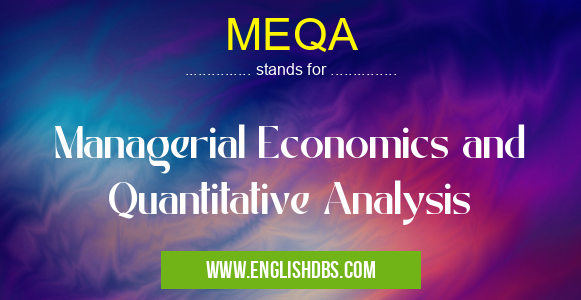What does MEQA mean in ECONOMICS
Managerial Economics and Quantitative Analysis (MEQA) is a program that equips students with the knowledge and skills needed to effectively analyze and apply economic concepts in real-world business contexts. The goal of MEQA is to enable students to develop an understanding of the principles of economics, data analysis techniques and economic thought, so that they can use these tools to address relevant business decisions.

MEQA meaning in Economics in Academic & Science
MEQA mostly used in an acronym Economics in Category Academic & Science that means Managerial Economics and Quantitative Analysis
Shorthand: MEQA,
Full Form: Managerial Economics and Quantitative Analysis
For more information of "Managerial Economics and Quantitative Analysis", see the section below.
Benefits Of MEQA
As employers seek out graduates who possess the ability to think beyond traditional economic theories when developing strategic solutions for their company's challenges, those with an MEQA degree are highly sought after. This versatile degree provides graduates with strong analytical skills to tackle complex problems in any field or industry. Graduates with an MEQA degree demonstrate an understanding of market dynamics as well as sound technical abilities which helps them stand out from other applicants during job search processes.
Essential Questions and Answers on Managerial Economics and Quantitative Analysis in "SCIENCE»ECONOMICS"
What is Managerial Economics and Quantitative Analysis (MEQA)?
MEQA is the application of economic, accounting and quantitative methods to managerial decision-making. It provides a basis for executives to make profitable decisions, improve operations and evaluate results systematically. MEQA integrates economic theory with quantitative analytical techniques in order to examine complex problems managers are likely to encounter in their work.
What role do economics play in Managerial Economics & Quantitative Analysis?
Economics provides the framework and tools needed for understanding markets and predicting outcomes to help managers understand the risks associated with business decisions and identify viable opportunities. By applying economic theories and principles, MEQA can determine how much value exists in any given transaction or set of transactions.
How does Managerial Economics & Quantitative Analysis differ from traditional economics?
Traditional economics focuses on broad macroeconomic trends, while MEQA applies economic principles at the micro-level within an organization. It looks at specific business models and operations rather than broad market forces that influence entire economies. Furthermore, MEQA uses quantitative analytics such as data analysis and regression analysis to gain greater insights into the decision-making process by testing hypotheses about behavior among firms or customers.
How is Managerial Economics & Quantitative Analysis used in practice?
MEQA is used by executives to assess potential strategies, analyze market conditions, identify sources of competitive advantage, optimize return on investment (ROI), evaluate contracts or other opportunities against competing alternatives, forecast future market conditions or revenue potentials, develop pricing models or cost-benefit analyses for investments or projects, and much more!
What types of businesses use Managerial Economics & Quantitative Analysis?
Businesses of all industries can benefit from gaining insights through MEQA. This includes manufacturing firms looking to optimize production costs through data analytics; banks analyzing loan risk portfolios; retail stores targeting customers with promotions based on past buying habits; technology companies forecasting customer demand for new products; energy companies planning resource utilization over time; telecommunications researching customer preferences for different services; healthcare providers assessing patient care costs for insurance purposes; marketing firms determining how online ads perform best; venture capitalists evaluating investments before committing funds; transportation companies optimizing routes for delivery efficiency; mining companies analyzing mineral production costs... these are just some examples of how many organizations are leveraging MEQA today!
What skills do I need to be successful in this field?
To succeed in this field you will need strong analytical skills (data analysis/statistics/mathematical modelling) as well as excellent communication skills which will enable you to effectively communicate your findings both internally within an organisation as well as externally when presenting your research conclusions or recommendations. Having an understanding of basic economics principles will also be advantageous when analysing problems involving market interactions between industry participants or different factors that affect supply & demand constraints etc. Finally familiarity with programming languages such as Python/R/SQL is also highly beneficial when dealing with large datasets which require more complex algorithms for advanced analytics capabilities.
Is there a specific job role dedicated to this field?
Yes there are - roles such as Management Consultant/Data Analyst/Business Analyst are all popular positions within organisations looking to use managerial economics & quantitative analysis techniques when making decisions related to strategic planning & forecasting or solving operational problems using data driven solutions etc.
Final Words:
The Managerial Economics and Quantitative Analysis program combines economic principles with practical applications of economic thinking across various fields enabling graduates to make more informed decisions within their organizations. Those who have earned an MEQA degree are well-prepared professionals armed with the necessary skillset for success in today's changing global economy.
